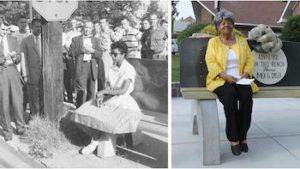
Elizabeth Eckford
*Elizabeth Eckford was born on this date in 1941. She is a Black news reporter, teacher, and activist.
Elizabeth Ann Eckford was born in Little Rock, Ark; she is one of 6 children. Her father, Oscar, was a dining car maintenance worker, and her mother, Birdie, was a teacher at a segregated school for the blind and deaf. When Thurgood Marshall argued the case of Brown v. the Board of Education before the Supreme Court, Elizabeth was inspired. She decided she wanted to become a lawyer and thought attending Little Rock's Central High School would help her achieve her dreams. She applied when they began looking for black students to join the student body for the first time.
On September 4, 1957, Eckford and eight other black students (known as the Little Rock Nine) failed to enter Little Rock Central High School, which was segregated. An angry mob of about 400 surrounded the school that day with the support of the Arkansas National Guard. The original plan was to have the nine children arrive together, but when the meeting place was changed the night before, the Eckford family's lack of a telephone left Elizabeth uninformed of the change.
Alone, fifteen-year-old Eckford tried to enter the school. At the same time, soldiers of the National Guard, under orders from Arkansas Governor Orval Faubus, stepped in her way to prevent her from entering. Eckford was surrounded by a crowd of armed guards and a mob of people, and she did not see any black faces. The mob included men, women, and teenagers (white students) who opposed integration. The white teenagers chanted, "Two, four, six, eight, we ain't gonna integrate." She attempted to go into the school through the mob but was denied entrance. Eckford walked to a bus bench at the end of the block.
Eckford described her experience: I stood looking at the school— it looked so big! Just then, the guards let some white students through. The crowd was quiet. I guess they were waiting to see what was going to happen. When I was able to steady my knees, I walked up to the guard who had let the white students in. He didn't move. When I tried to squeeze past him, he raised his bayonet, and then the other guards moved in, and they raised their bayonets. They glared at me with a mean look, and I was very frightened and didn't know what to do. I turned around, and the crowd came toward me. They moved closer and closer. Somebody started yelling, "Drag her over this tree! Let's take care of that nigger!"
Eventually, she gave up and tried to flee to a bus stop through the mob of segregationists who surrounded and threatened to lynch her. Once Eckford got to the bus stop, she couldn't stop crying. A reporter, Benjamin Fine, having in mind his 15-year-old daughter, sat down next to Eckford. Soon, she was protected by a white woman named Grace Lorch, who escorted her onto a city bus. For the next two weeks, the Little Rock Nine stayed home to study instead of going to Little Rock Central High School.
On September 23, 1957, the Little Rock Nine approached Central High again. Elizabeth Eckford and the other eight students, accompanied by city police officers, were let into the high school through a side door. All the city's high schools were closed the following year, so Eckford did not graduate from Central High School. However, she had taken correspondence and night courses, garnering enough credits for her high school diploma. In 1958, Eckford and the rest of the Little Rock Nine were awarded the Spingarn Medal.
Knox College accepted Eckford but returned to Little Rock to be near her family. She later attended Central State University, earning a B.A. in history. In 2018, Eckford was awarded an honorary doctorate from Knox College. Eckford served in the United States Army for five years, first as a pay clerk and then as an information specialist. She also wrote for the Fort McClellan and the Fort Benjamin Harrison newspapers. After that, she worked as a waitress, history teacher, welfare worker, unemployment and employment interviewer, and military reporter. She is a probation officer in Little Rock.
In 1997, she shared the Father Joseph Biltz Award—presented by the National Conference for Community and Justice, with Hazel Bryan Massery, a then-segregationist student at Central High School who appeared in several of the 1957 photographs screaming at the young Elizabeth. During the reconciliation rally of 1997, the two women made speeches together. But later, their friendship broke up, with Eckford reflecting, "[Hazel] wanted me to be cured and be over it and for this not to go on anymore. She wanted me to be less uncomfortable so that she wouldn't feel responsible." In 1999, President Bill Clinton presented the nation's highest civilian award, the Congressional Gold Medal, to the members of the Little Rock Nine.
On the morning of January 1, 2003, one of Eckford's two sons, Erin Eckford, age 26, was shot and killed by police in Little Rock. The newspaper later reported that prosecutors investigating the fatal shooting had decided that the police officers concerned were justified in shooting Eckford. In 2018, 60 years after leaving Little Rock Central High, Eckford told her story in her first autobiography, The Worst First Day: Bullied While Desegregating Little Rock Central High.
The book was co-authored by Dr. Eurydice Stanley and Grace Stanley of Pensacola, Florida. Grace was 15 years old when she worked on the project, the same age Eckford was when she desegregated Central High. Eckford traveled to New Zealand in 2019 to teach American civil rights history to more than 4,000 students with Dr. Stanley at the request of high school teacher Roydon Agent, author of Public Image, Private Shame.